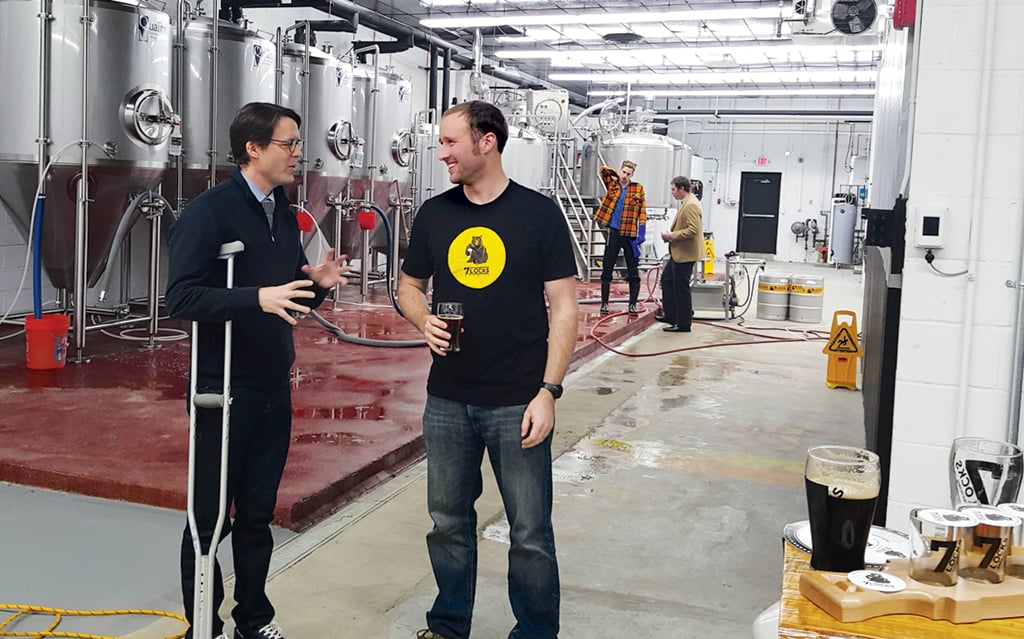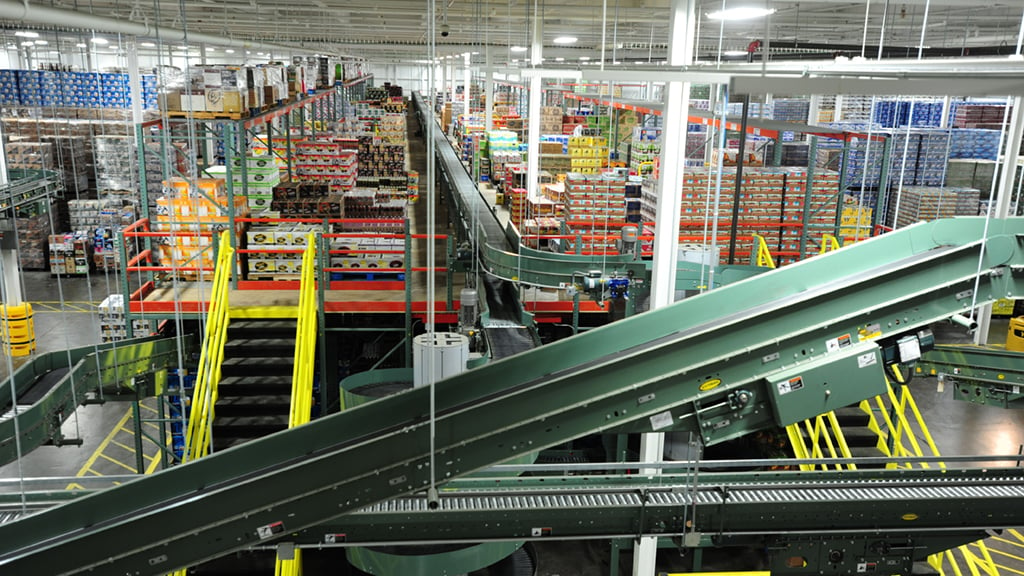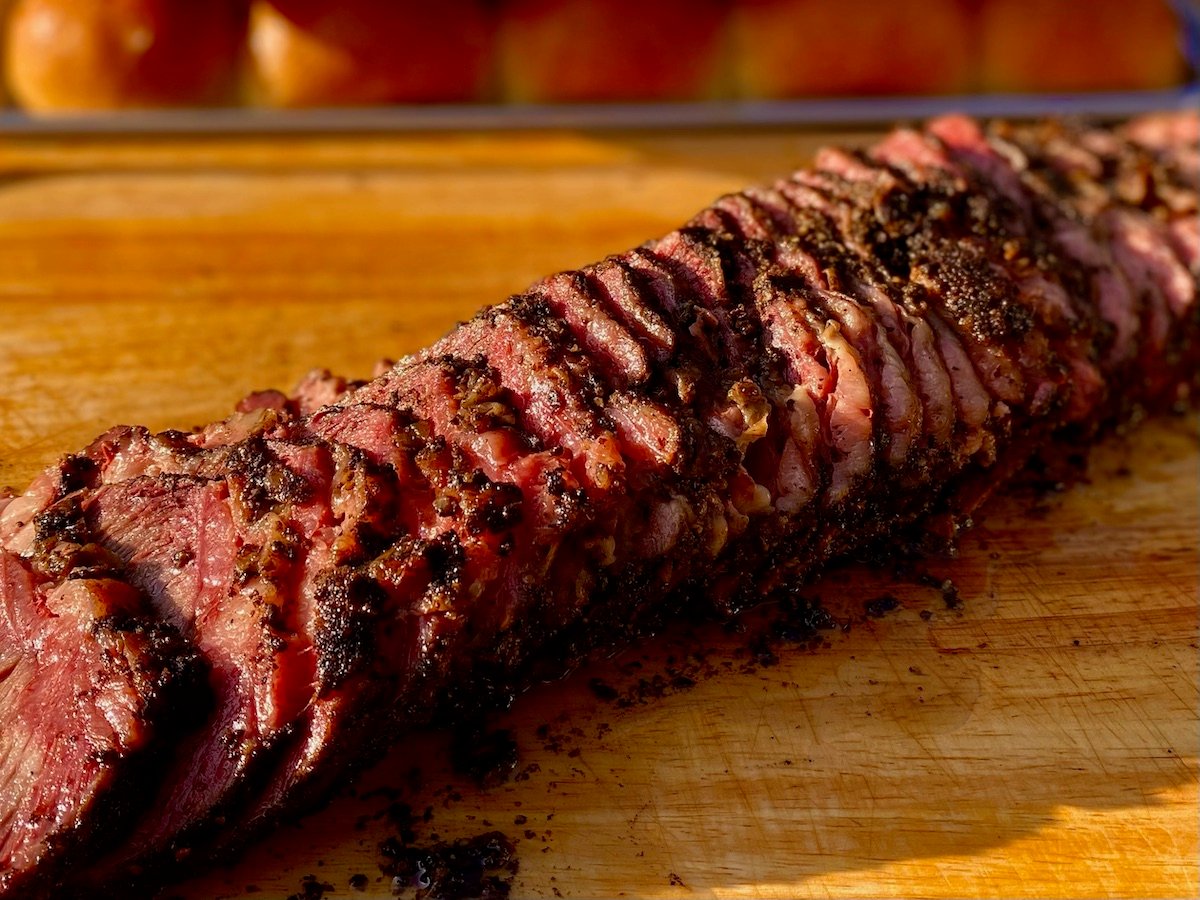In the last week of 2015, a familiar disaster struck Brickside Food & Drink in Bethesda. The culprit: the Department of Liquor Control. From two days before Christmas until two days before New Year’s Eve, the DLC—an 80-year-old government entity that maintains a monopoly on the county’s alcohol supply—missed its deliveries to Brickside, shorting the Woodmont Triangle eatery by more than ten kegs of beer and about 50 cases of wine, liquor, and bottled beer.
To keep his taps flowing at the busiest time of year, Brickside’s manager drove from one DLC store to another—the department also operates all of the county’s hard-liquor stores—to secure enough alcohol to get through the week. Even so, says Brickside’s owner, Brian Vasile, the restaurant ran out of eight or nine items: “It can’t get any worse than them just not coming.”
When the DLC Christmas delivery finally arrived on the day before New Year’s Eve, “they just dumped it all and rolled out,” says Vasile, who also owns the Adams Morgan bar Grand Central.
Vasile wasn’t alone. More than 50 Montgomery establishments spent their holiday week scrambling to make up for similar shortages, chalked up to a clerical error at the department’s Gaithersburg warehouse. At the time, the DLC’s New Year’s debacle—which led to the resignation of its director, George Griffin, a county native who’d held the position since 2001—seemed like a final straw that would lead to the reform of Montgomery’s liquor business.
But since then, restaurant owners in the county have come to see Griffin as only the latest fall guy for a system whose unreliable deliveries, limited selection, and lack of accountability are endemic. While his resignation has led to a new push for reform, the effort is one more chapter in a long, fraught history of wasted task forces, unpassed legislation, and interjurisdictional battles, all fueled by the liquor authority’s $30 million in annual revenue.
Jackie Greenbaum, who recently shuttered her much-loved Silver Spring restaurant, Jackie’s, cites the DLC as the reason she’ll never open another eatery in Montgomery County. “It places an unfair and unnatural burden on businesses,” Greenbaum says. Last March, at a Montgomery County Council meeting in response to the New Year’s catastrophe, RW Restaurant Group owner Frank Shull put it more simply. The DLC, he said, is “an evil empire.”
• • •
Shull’s rhetorical echo of the Cold War isn’t a bad way to begin to understand the DLC controversy, because the ills that plague the system are reminiscent of bygone Soviet commerce: shortages of common items (Miller Lite!), obsolete technology, petty thievery, and inconsistent delivery schedules. What’s more, with private competition banned by law, the DLC has no incentive to provide competitive prices or service.
It’s a mess whose roots go back to the repeal of Prohibition in 1933, which left states to decide how to regulate their reborn alcohol businesses. Most jurisdictions became “licensed states,” where wholesalers and retailers were granted licenses to buy and sell adult beverages. But in a few places, Prohibition-style fears of rampant consumption and proliferating liquors stores lingered. Eight decades later, 17 states—including Pennsylvania, Virginia, and Ohio—remain “control states,” meaning that the states’ governments take ownership of alcoholic beverages and distribute them. Montgomery County is one of the very few local jurisdictions in the US to operate on the control model. Besides its monopoly on distribution, the county owns 25 liquor stores that are the only places to buy spirits. (Licensed independent retailers can sell beer and wine as long as they aren’t grocery stores.)
But Montgomery has changed a lot since 1933. When Prohibition was repealed, the county was a mostly rural, conservative community of fewer than 80,000 residents. Even as it suburbanized, liquor threatened Montgomery’s settled way of life. “We think of our county as a bedroom community rather than a center of revelry,” William R. McCaullum, president of the boosterish Allied Civic Group, declared in 1962. “Besides, we can always go to the District for a drink with dinner.”
The ills that plague the system are reminiscent of bygone Soviet commerce: shortages, obsolete technology, thievery, and inconsistent delivery.
Today, Montgomery County is a diverse patchwork of urban, suburban, and rural areas, with more than a million residents, that competes directly with DC for jobs and business, including entertainment. County officials no longer want to see its citizens crossing the District line to do anything, much less pay high-margin bar tabs.
Yet the data says they do. According to US Census numbers, the county accounts for 11 percent of the Washington area’s bars and restaurants. But measured by alcohol sales per resident, the county underperforms by 20 percent, making just $789 per capita against $989 in the region as a whole. Montgomery’s bars and restaurants employ 23 percent fewer workers, as a percentage of its population.
“Why could this be happening?” political consultant Adam Pagnucco wrote on Seventh State, a local blog. “Are we a county of shut-ins?”
No, say local restaurateurs—the answer is the DLC. In the words of Brickside’s Vasile: “It’s because we’re a frickin’ dinosaur.”
The frickin’ dinosaur, though, avoids extinction thanks to two things even older than Prohibition: politics and money.
• • •
Politically, the liberal county is a place where unions wield a lot of power. Some 350 DLC workers are represented by Local 1994 MCGEO of the United Food and Commercial Workers, which is wary of plans that could endanger their paychecks or job security.
Guaranteeing the union a voice in restructuring the DLC might solve that problem. Money is trickier: The liquor business contributes $30 million to Montgomery’s hopper—money that pays for roads, schools, and libraries across the county. Because voters tend to get more upset about underfunded schools and highways than about inefficient liquor distribution, kicking the bottle is very difficult.
Not that there isn’t a colorful history of people trying to do just that. In 1980, County Executive Charles Gilchrist commissioned a former liquor wholesaler, Len Colodny, to conduct a study. Colodny found clear evidence of favoritism, questionable hiring, and conflicts of interest. Reporting his findings in July 1980, the Washington Post described a “network of men—many of them close friends or relatives—who have dominated the $60 million-a-year Montgomery liquor system for decades . . . .” A New York distillery, Schenley Industries, none of whose brands figured in the top 20 most popular drinks in the county, claimed 10 percent of Montgomery County’s liquor trade. The county’s Schenley salesman, it turned out, was the uncle of deputy DLC director Frank Orifici’s wife.
Colodny’s report led to a grand-jury investigation as well as a yearlong county task force to study the corrupt system. (It also prompted a feud between Colodny and the Post after the paper published, without his permission, portions of phone conversations with corrupt officials he’d recorded during his investigation. Colodny later published a book, Silent Coup, challenging Bob Woodward’s version of the Watergate affair. Woodward, in an e-mail, calls Silent Coup “the most widely and thoroughly discredited of the conspiracy theories about Watergate.”)

A decade later, the county was analyzing the DLC again, this time debating privatizing Montgomery’s retail liquor stores. But after County Executive Doug Duncan proposed this and his legislation passed the House of Delegates, the independent store owners who’d backed the bill got cold feet, worried they wouldn’t be able to obtain a license to sell spirits after privatization. They hired a lobbyist to amend the bill to simply prohibit the county stores from selling chilled beer, mixers, and items such as Metro cards and corkscrews, and left it at that. Duncan refused to touch the liquor issue again.
Duncan attributes the pattern of debates and task forces that go nowhere to the county’s “paralysis by analysis.” “We study things to death, we restudy things to death,” he says. “It doesn’t matter if you do anything at the end of it.” He tells a story from his first days in office in 1994, when a fire in an illegal dump burned for months while the county council discussed the best way to deal with it. “I just said, ‘We’re gonna put this fire out,’ and we did it in a week.”
• • •
The dump fire that is the DLC has gained some urgency of late as wine and beer have undergone a craft revolution. Few of the smaller, local products that drinkers are demanding these days appear on the DLC’s stock list, which favors brews from conglomerates such as AB InBev or lowest-common-denominator potions like Yellow Tail Chardonnay. At Jackie’s in Silver Spring, none of the wines were taken from the DLC stock list because, says Greenbaum, “in my opinion, no respectable restaurant operator would carry that stuff.”
Instead, she worked with wine representatives from Bacchus Wine Cellar in DC and Elite Wines in Lorton, who then placed her orders through the DLC. Besides the rigmarole, the county booze cost Greenbaum roughly 15 percent more than if she’d bought directly from the vendor. A glass of Mohua New Zealand Sauvignon Blanc goes for $9.33 in her DC restaurant, Bar Charley. In Silver Spring, she says, it costs $11.35.
“So there’s two distributors, two markups, twice as many ways that something could go wrong,” says Hans Riemer, a Montgomery County Council member who became interested in reforming the DLC after Greenbaum explained the absurdity of the situation to him several years ago. “That’s when I realized the whole system is breaking down in that part of the distribution process.”
So there’s two distributors, two markups, twice as many ways that something could go wrong. That’s when I realized the whole system is breaking down in that part of the distribution process.
Earlier in 2014, a law designed to support local brewing granted beermakers in the county permission to distribute their products without having to go through the DLC. After the change, Brett Robison, bar manager at Takoma Park’s Republic, began buying beer only from local breweries. “I saw it as there’s this huge opportunity to build a very much untapped craft-beer scene,” Robison says.
Riemer began to devise a plan to open this window further: Why not allow any vendor whose goods weren’t on the DLC’s stock list to sell directly to bars and restaurants? His campaign got unintentional help from members of the DLC’s workforce: In November 2014, an NBC4 investigation caught DLC truck drivers drinking on the job and warehouse workers skimming cases of beer to sell on the black market. Aided by the revelations, Riemer convinced County Council president George Leventhal to commission an ad hoc committee to suggest reforms, including Riemer’s privatization of the special orders.
The beauty of only partially privatizing the liquor trade, says Riemer, was that it would draw down only $5 million from the $30 million the county depended on. Any warehouse jobs lost, furthermore, could be made up on the retail side, which would expand by three stores, a promise that convinced Local 1994 MCGEO president Gino Renne to get onboard. By last October, backed by a “brain trust of restaurant all-stars” as well as County Executive Isiah Leggett, Riemer believed he had the votes to pass his bill in the council.
But the momentum for change was already passing Riemer by. As he introduced his legislation, a campaign led by Delegate Bill Frick—who represents Bethesda and Potomac in Annapolis—called for de-monopolizing the liquor market entirely. Frick proposed a bill at the State House that would put the question to the voters in a referendum on the 2016 ballot. Naturally, opening the market to all comers, which would spell the end of the DLC, was a nonstarter for the union and for the county’s budget-makers. Besides depriving the county of its $30 million, the cratering of the DLC would also require an immediate payoff of $100 million that the county had borrowed for various projects including building a new warehouse in Gaithersburg.
The Frick and Riemer bills were withdrawn in February. “When [everyone] realized Bill Frick’s bill was going nowhere, it was too late,” Riemer says. “The image I have in my mind is ships wrecked on rocky shores. There’s a lot of shipwrecks of failed efforts.”
Leggett has gone on record saying he would support a new task force to study the problem.
• • •
Faced with an existential threat, the DLC has made notable improvements. In its new 210,000-square-foot warehouse hangs a sign that reads “100% Accountability, 0% Excuses.” Chief of wholesale operations John Zeltner is also trying to make the computerized ordering system more efficient. (In March of last year, the county’s inspector general found that the warehouse was using sticky notes to track missing inventory—as many as 154 cases a day.) According to CountyStat, which monitors performance in all county departments, the accuracy of special orders has improved by 14 percent since February. Missed deliveries are down by 40 percent.
The restaurateurs are still holding out for a permanent fix, even as they conceive of it in apocalyptic terms. If Riemer’s bill were to go through next year, Republic’s Robison says, even the limited opening of the market would be a “rift in time and space.”
Imagining a glass of beer untainted by DLC shenanigans, Robison sighs: “Free market rules, man.”
Editorial fellow Greta Weber can be reached at gretamweber@gmail.com. On Twitter, she’s @gretamweber.
This article appears in our June 2016 issue of Washingtonian.




















